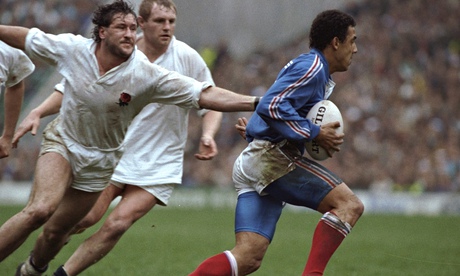
England’s 21-19 win over France at Twickenham in the 1991 Five Nations secured the home side’s first grand slam in 11 years but it was a French try that captivated Frank Keating …
Four momentous tries gilded Saturday’s climax, with the first possibly the most opulent since old men with memories were themselves at their grandfather’s knee. That takes in all the rich history of the Five Nations championship.
The very context sharpened the grandeur of its daring, dotty conception and the nerveless joy of its execution. For the challenge, in bold relief, matched England’s substance, nous and penalty power against France’s airy elan, spontaneity and dextrous tricks and treats. At once the two philosophies collided. England missed a long penalty and all eyes and senses, certainly those of the England XV for a moment, relaxed and prepared for a 22 drop-out.
Suddenly all hell broke loose or, rather, the incomparable Blanco, dusky warrior-captain of France, did. “Moi, moi,” he shouted to Saint-André. Blanco has always put his trust in gods who favour the foolhardy. He was now across his line but still by only 10 yards. In a trice the ball was with Lafond outside him and the wing’s left hip took out Andrew, first to spot the danger, and an instantaneous finger-tip pass allowed Sella, at speed, to round his own despairing white marker.
Sella was over the 22 and momentarily clear as England regrouped and frantically funnelled back. The stalwart Probyn had tanked across to confront him on the 10-metre line. Sella feinted to knife inside him and, as he did so, he turned in a dummy-scissors loop and fed on the outside again, the delicate Camberabero. The pit-a-pat fly half could now snipe across the halfway mark.
Then, with dainty exactness, he slippered the ball over the head of the retreating Hodgkinson, caught it in full-pelt stride and was now up to England’s 22-metre flag. Though England’s bold general Carling had remarkably made it across the field he could only fling himself at Camberabero a split second after the Frenchman had dapped the most perfect cross-kick to within five metres of the posts.
This took out the corner-flagging Hill and left Saint-André to compose, collect and triumphantly launch himself at the line as Guscott’s all-in, last-gasp dive lassoed his ankles. The palpitating thing was done.
From line to line it took 17.25 seconds, four more than the previous collective marvel of the age, for the Barbarians at Cardiff on 27 January 1973, when the dancing Bennett dared and set in train that breathtaking passage down another touchline. For Dawes’s phoney dummy there, read Sella’s phoney scissors here; for Quinnell’s genius slip-catch from David, here was Camberabero’s chip-and-catch.
But that Barbarians epic was done with licence to cavort. Saturday’s audacious try was inspired by all the vivid intensity of the grandeur of the Slam.
Memories of another inspired collective score, touched by angels, came to mind when the cockles calmed themselves: in 1980, high on the veldt of Northern Transvaal in May, the Lions were losing 16-19 with minutes to go. With defiant courage Quinnell (again), Patterson, Richards, Renwick, Woodward, Hay and nine others poured themselves in desperate tides at the opposition line through five rucks, 33 pairs of hands and a minute and three-quarters of optimism until Slemen plunged in the killing thrust under the posts.
But that was no Grand Slammer and those who were there that day agreed this weekend that the palm was now for France, the grandest of the grand. As the Barbarians’ score in 1973 will always be “Bennett’s try”, so will Saturday’s be “Blanco’s try”. What a way to go.
Two hours after he had showered, and easily into his 10th cigarette, he was shruggingly explaining the sweet 17 seconds. He was in his ‘je ne parle pas Anglais’ mood but the translation is roughly this.
“The try? It is communion. No one man scores a try, the whole team scores it. The communion made this try, because all of us opened our minds to score it. No one man has the vision, the whole team has the vision, 15 as one man.”
Had he seen the English momentarily drop their guard?
“Non. Il est instantané, il est spontané, instinctif. C’est le rugby. Finis.” His dark eyes glistened. He smiled and lit another cigarette from the glowing stub of the previous one.
Along the corridor the heroic, relieved English were rightly celebrating. All they had wanted was to win something tangible, they had insisted, and they dedicated their victory to their grandchildren.
“Is it true, grandpa, that you were in the Grand Slam final way back in ’91?”
“Yes, my child, I was.”
“Tell me, grandpa, was Blanco’s try as good as the history books say?”
“Argghhh!”
This article was originally published in the Guardian on 18 March 1991 and appears in The Highlights: The Best of Frank Keating, edited by Matthew Engel, published by Guardian Faber at £17.99. Click here to order a copy for £12.99 with free UK p&p or call 0330 333 6846.

